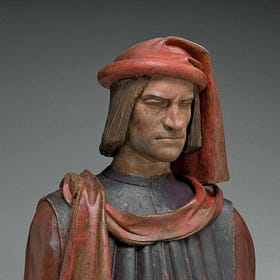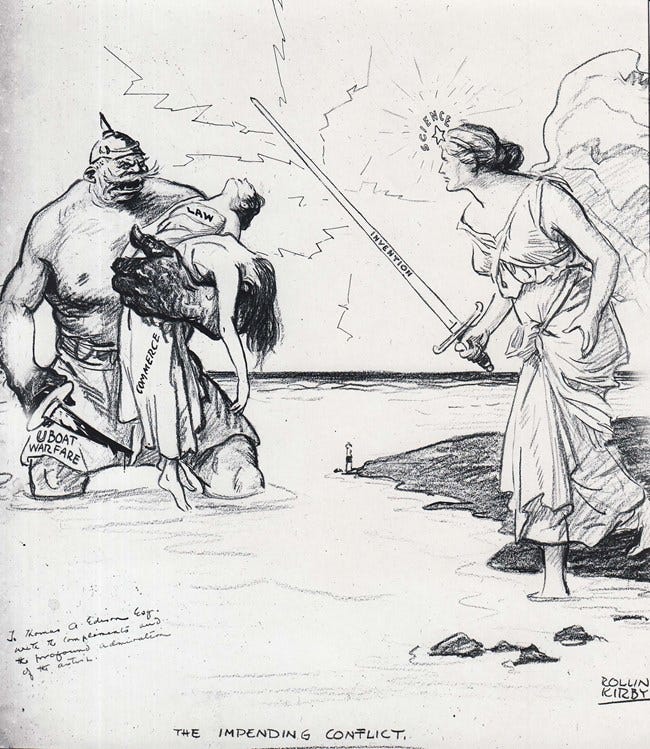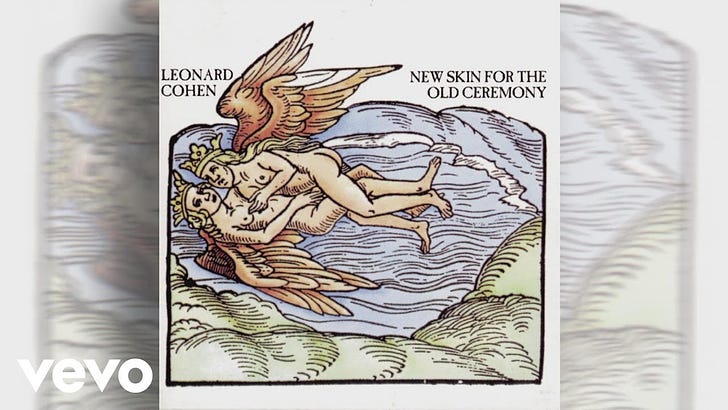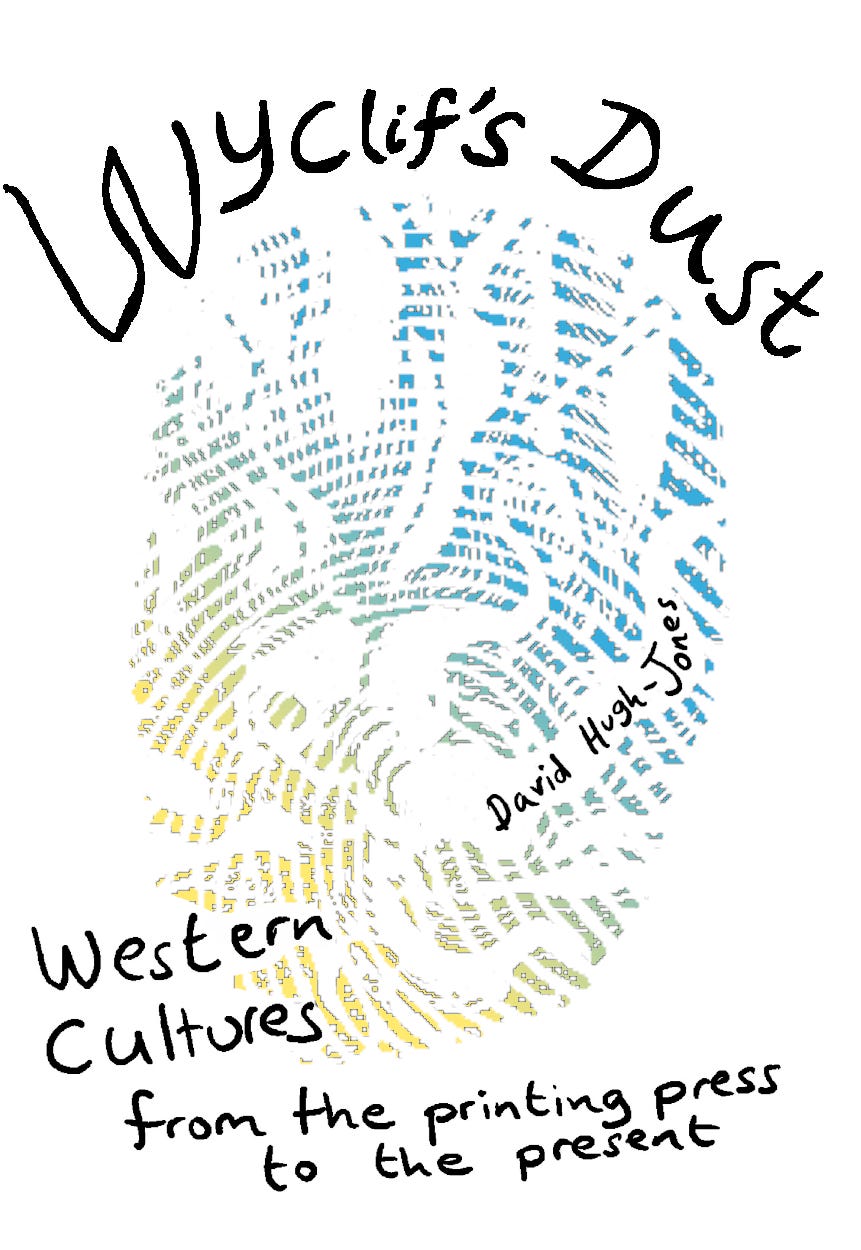The global defeat of democracy: a scenario
(This is the first part of a larger essay developing my thinking on international politics today. The whole piece should serve as a backdrop to some more specific ideas on culture that I hope to work out next year. I’ve written other newsletters on democracy:
How to think about democracy and autocracy in 2023
This is the kind of post that should be an academic paper, but it has a lot of loose threads and uncertainties, and you can’t admit those in a paper. The point is, it isn’t a journalistic comment on how autocracies are doing versus democracies right now, instead, it’s me trying to think through the right “model” to have of democracy versus autocracy. Ho…
The Italian city-states as a distant mirror
My thinking about the political future is dominated by two clashing master-images. The first image is the continuing backwash of freedom across the globe from West to East. This started when settlers from the Atlantic seaboard colonized North America, made up their own rules to govern their societies, and eventually threw off the metropolis, starting wi…
The global competition between exit- and voice-based legitimacy
I’m still in Airbnb hell, cursing my inability to exit a dominant platform. Hope you enjoy this quick sketch of an idea. I suppose the dominant frame for thinking about international relations now is as a conflict…
I’ll update this piece with links to the rest of this essay, once it is written.)
A new conflict is developing between Western democracies and non-Western autocracies. I think the democracies are likely to lose it.
Scientists distinguish between predictions and scenarios. Predictions are what you think will happen. Scenarios, like the ones climate modellers use, represent what will happen “if”. Climate models have a (relatively!) simple lever to change scenarios: how much greenhouse gases we put into the atmosphere. I don’t think there is any single, simple lever to improve democracy’s chances. Doing so will require the skills of politics: virtù to seize the kairos, the moment of opportunity. So what I outline below is more like a probabilistic prediction, or simply a warning.
To put my cards on the table, I write as a critical friend of democracy. I value not democracy itself but liberalism, a system of individual rights and freedoms. But democracy has traditionally been thought of as necessary for the long-run survival of liberalism — like a nest which keeps the egg of liberalism safe. On the other hand, democracy can also threaten liberal values, and that is clearly an issue today in the form of populists like Trump.
Actually Existing Democracies are pretty good places to live, and many of them have had some kind of democratic institutions for centuries. I am attached to these institutions and want them to succeed. But if they are incompatible with liberalism, then liberalism is more important.
Most people don’t see it that way. There is a lot of cheerleading for democracy, and not much for liberalism, which is disliked by a wide assortment of odd lots on the right and the left. One reason is that democracy is more concrete than liberalism. Democracy is a political system: it states who is in charge. Liberalism is not a system, but a set of qualities — there have been illiberal democracies and liberal autocracies. Many of those qualities, like the existence of the rule of law, are quite subtle. A country may have a large corpus of law, but if judges are venal or under the thumb of the executive, then there is no rule of law. In the same way, free speech may be written explicitly into a constitution, or it may be supported by a culture that recognizes its importance. Liberalism is hard to recognize and cheer for. Also, unlike democracy, it does not empower anyone — it is, almost by definition, a set of curbs on power. (Democracies have politicians, whose power depends on democracy’s continuance; so self-interest makes them loyal to it.) For these reasons liberalism is not often recognized as important. This makes it vulnerable. In theory, liberalism can exist without democracy, and it has done so in practice in some times and places. But if democracy loses this global conflict, liberalism is likely to be a casualty, especially because its opponents are neither liberal nor democratic.
The struggle between democracy and its opponents does not exist by chance or ill-will. It reflects deep conflicts of interest. China, Russia, Iran and North Korea — call them the CRINKlies — want to change the international system in their favour. The West wants to keep the system that favours it. Any international system of rules favours some countries more than others. Since 1990 the US has been the world’s policeman. It and its allies got some benefits from that. Now its commitment to that is weakening, and others are auditioning for the job. We are moving into a “multipolar world”. That does not mean nice, peaceful pluralism. It means conflict.
What do I mean by defeat? There may be a hot war between America and China and their respective allies. If so, we will all lose. More likely there will be a new Cold War, featuring ideological competition, subversion, proxy wars and economic conflict as each side tries to expand its set of trading partners.
Defeat in a Cold War doesn’t have to come suddenly, the way the USSR lost in 1989 and 1990. It can be more gradual. Emerging democracies may settle in the non-democratic camp. People may migrate from democracies like Pakistan to non-democracies like Dubai. Non-democracies may become richer and democracies relatively poorer. The autocratic camp may peel off some countries into its Asia-centric trade network, leaving Western Europe and North America as a rump. Democracy may lose its moral lustre and international prestige. It may seem like not the end of history, but a wrong turning into a backwater.
In particular, while the Warsaw Pact communist dictatorships imploded in spectacular revolutions, it’s intrinsically less likely that democracies will go the same way. When dictators lose legitimacy, people take to the streets. Democratic elections exist so as to make taking to the streets unnecessary. Cynical, apathetic, deluded or authoritarian electorates can simply vote for leaders who hollow out democracy from the inside. Democracy may become a “dignified” rather than an “efficient” institution, in the phrase of Walter Bagehot — a jolly piece of pageantry:
(It's interesting what happened to the Republic of Lucca. Remember how Hobbes skewered it in the 17th century? By the time he wrote, his contempt was surely a commonplace rather than a shocking revelation.1 While actual republican participation declined and elected positions became politically irrelevant, the show of democracy was encouraged by songs and operas celebrating republican history and the virtù of famed citizens. Participatory politics became a cosy sort of tradition.)
A defeat of democracy also doesn’t have to mean the defeat of the democratic camp. It’s easy to imagine China having more enemies than friends, especially considering that India is naturally its geopolitical rival and is likely to plump for “us” in the end. The stronger side may well win. But the Western camp contains many non-democracies or partial democracies, notably Turkey, Saudia Arabia and again India. In the first Cold War such actors were known as “our bastards”, a phrase which acknowledged an uncomfortable reality, but preserved democratic dominance. Now, it is much less obvious who belongs to whom. All those three countries are clearly too powerful to be treated as clients.
So one possibility is that the democratic camp wins but democracy itself is a casualty. After all, in conflict, centralized leadership is often an advantage, so all sides may become less democratic. Democratic leaders may copy authoritarian techniques. Meanwhile, the weaknesses of democracy may continue to nibble at democratic institutions, irrespective of the international situation.
In future parts, I’ll detail those weaknesses, which were already endemic as democracy entered the ring in the 2020s:
Ideological weakness
Political weakness
Fiscal weakness
International weakness
This will make the case that democracy is seriously at risk, and that we are not facing a simple rerun of the Cold War, where we are guaranteed to emerge as victors.
Tell me what you think in the comments.
If you enjoyed this, you might like my book Wyclif’s Dust: Western Cultures from the Printing Press to the Present. It’s available from Amazon, and you can read more about it here.
I also write Lapwing, a more intimate newsletter about my family history.
Hobbes may have copied this meme from an earlier Italian historian. “Rinuccini… condemned [the Medici] as tyrants, telling us that ‘the fine words and the golden letters’, in which the word liberty was inscribed on one of Florence's banners symbolizing its famous love of freedom, ‘clash with the facts’.” Brown 2004, “Rethinking the Renaissance in the aftermath of Italy’s crisis”.







The state is a social scaleup tech. It is more than 5000 years old. It is an add on to the early tech of chiefdoms, which was itself built on tribes, which are constitutive in humans. When the Holecene began the climate became less variable and it was possible for the population to grow. This led to increased competition for the best hunting&gathering lands. A competition between two groups will likely he settled in favor of the larger one because if it comes to fight they are likely to prevail.
Around 9000 years ago there was a town in Turkey called Catal Hoyuk where lived perhaps 5 or 10 thousand people. Imagine a tribe of less than a 1000 humans beholding this society with its thousands of guy. Would you take them on? Nope. And so they never needed to fight. There is no evidence of any fortifications at Catal Hoyuk. No evidence of social class, houses were all the same size.
Humans are Great Apes; they are *not* herd animals. Put 200 Great Apes into a group and violence will break out. And yet here was many times this number all living cheek and jowl. How the fuck did they do it? Nobody really knows. In other places people were not so lucky. Jericho around 10000 years ago showed evidence of extensive fortifications, but it was much smaller in population.
So the message is clear, get big or prepare to be warred on and if you don't have your shit together get wiped out. To get big a group needs social scale up technologies. To fight effectively, one needs effective leadership. How do you get this?
Humans are band animals and also cultural animals. Our chimp and gorilla cousins are band animals and use dominance hierarchy for organization. Humans still have dominance capabilities, but as cultural animals we also have prestige. A band can have dominant individuals and charismatic "big men" who have prestige. Dominance has become constrained once humans developed projectile weapons tech (i.e. throwing rocks, later spears, and then bow & arrow). Asshole alpha males could be eliminated from the gene pool by disgruntled beta males or females for that matter and humans gradually became domesticated. "Big men" (or "big women") became the influencers (we still have these today).
Unlike our ape cousins, humans are also tribal. It was possible for influencers from various bands with the tribe to collborate on shared projects. Monumental architecture like Gobekli tepe, Karahan tepe and other monolithic sites started to appear around 11-12 thousand years ago showing this capability was already present in humans and only needed the milder climate to grow the numbers needed to put it to work.
Well if you can get hundreds or a thousand or more people in a tribe to collaborate on something like Gobekli, you can get them to collaborate on group defense in the face of a threat. To fight effectively, you need a military leader. Such an individual would as sort of a dictator for a time and then retire back to normal life when the crisis is over. Over time the chief became a permanent position and eventually even a hereditary one. This set up is a chiefdom. In a chiefdom you have a chief and a groups of tribal leaders. Among this group the chief is first among equals replicating the band with "big man" leaders that is hardwired in, Each tribal leader had his own posse of near-equals, the big men of the various bands. What I am describing in a hierarchy. The tribal band is the base of the hierarchy, hard-wired into us humans (but not present in the other apes). Layered on top is a replica of this tribal band structure that is the chiefdom layer. An another layer on top and you yet a complex chiefdom or proto-state, and with another a state.
By the time you get to a proto-state or state level there is a vast gulf between the individual on top (often seen as a god) and the masses at the bottom. People at the bottom of the hierarchy could be and in some societies often were used for human sacrifices. These early states were frequently absolute dictatorships. Along with the expansion of layers of hierarchy came craft specialization and division of labor, which are one of the hallmarks of the state. By 5000 years ago there were states in Egypt, Iraq, India, maybe a bit later in Afghanistan and China.
The invention of horse-riding and composite bow tech that permitted mobile warriors wielding projectile weapons from much smaller chiefdom or even tribal societies to effectively raid state societies means more scale up, from state to empire. But empires constructed of conquered states with ruled by god-kings created a lot of rival. An emperor requires loyal vassals who operate as gods in their own kingdoms. It is hard to rule gods and new scale-up techs were needed. Modern moralistic religion (Judaism, Zoroastrianism, Buddhism, Christianity, Islam etc.) appeared and served this scale up function. Since then there have been more, capitalist, the Enlightenment/Science, Democracy.
So, anyway the state was not invented as an extraction scheme. Though this did okay a role in the evolution of capitalism.
In what sense is India not a democracy?